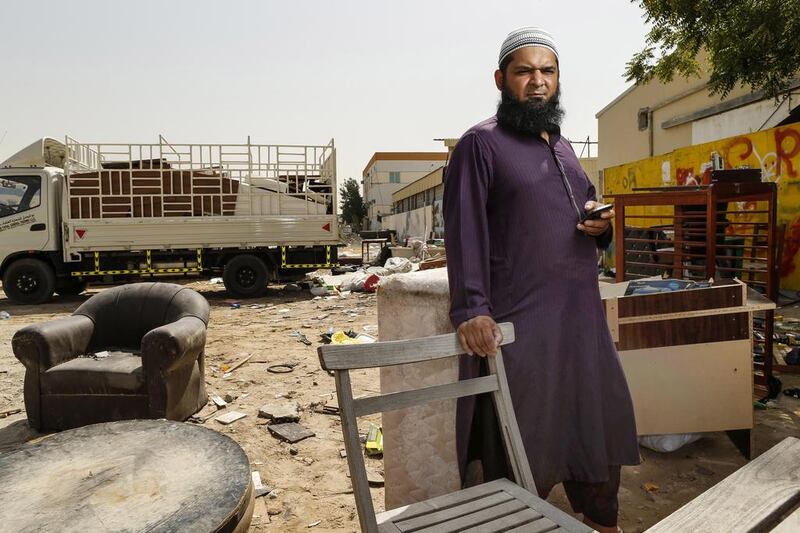DUBAI // He has been described as a Robin Hood-type figure, taking from the rich and giving to the poor.
But the goods that Faisal Khan collects from luxury apartments in Dubai are freely given and would otherwise have ended in landfills.
His service, Take My Junk UAE, has for the past five years become the last resort of expatriates who have been unable to sell their furniture before leaving the country.
“Normally, we get a call from people saying they need us to collect their sofa or coffee table just a few hours before they’re supposed to fly out,” said Mr Khan, 39. “They have probably been trying to sell it and haven’t been able to find a buyer in time. They call us because they don’t want to just throw it out.”
Mr Khan started his service in 2009, at the height of the financial crisis, when thousands of expatriates who had lost their jobs were forced to leave the country.
Back then, he had just one lorry, and one or two people to help him. The goods he collected were distributed later that day to labour camps or to poorer families in Ajman.
But, despite having three mobile phones and making close to a dozen pickups a day, Mr Khan could not manage the demand.
He hired more labourers, rented more lorries and leased out warehouse space. The operation has now grown into a 100-man project, with 10 lorries and a 15,000-square-foot warehouse in Ajman.
To handle overheads that have now risen to about Dh220,000 a month, Mr Khan began selling the furniture he collected at a makeshift flea market in Ajman.
Still, the prices are negligible: a three-seater sofa will go for about Dh100.
“In Ajman, the typical monthly salary is between Dh800 and Dh1,000,” Mr Khan said. “They can’t afford to buy these brand new. This is the only place they can come and buy something of this quality for that price.
“All of this stuff would have just ended up in landfills.”
He said his team now carries out about 1,000 pickups every month, with the majority being sofas, coffee tables, cupboards and bedframes.
The goods are normally kept for about 30 days. If they cannot be sold during that time, they are given to labour camps or to poor families.
“We have a lorry going around to labour camps in Ajman every single day for the past six months,” Mr Khan said.
If anything is left over after that, the goods are recycled.
Mr Khan said about 50 tonnes of wood a month was given to Union Paper Mills, which uses the material as fuel to power its factories.
“We had to find a way to recycle it,” he said. “We were getting too much stuff and had nowhere to store it. We didn’t want it all to end in landfills either. This way, absolutely nothing is wasted.” Mr Khan, who is of Indian descent, was born in Dubai and raised in Toronto. He moved back to the UAE seven years ago with his parents, wife, brother and children. He now has seven children aged one to 16.
He was involved in housing development in Toronto and decided to start Take My Junk in the UAE after seeing a similar service in Canada.
He said the UAE was a unique place, with a transient population, which meant there was always a need for a service like his.
“People leave the country and realise they can’t take everything with them,” he said. “We’re not a charity but I believe we have a responsibility to stop waste and help people on a lower income.”
For information, visit www.takemyjunkuae.com or call 800 JUNK.
mcroucher@thenational.ae






